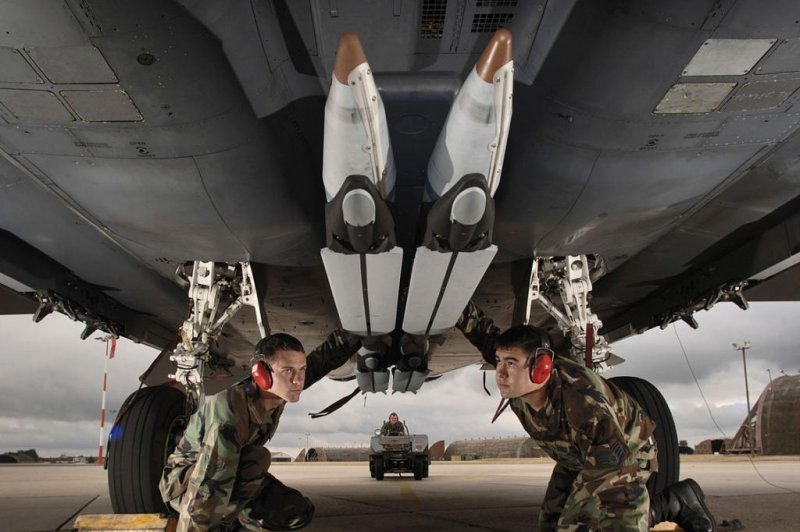1 of 2 | Airman 1st Class Matt Aggers (left) and Staff Sgt. Randy Broome perform a final check of the stowed twin wings on four ground-training small diameter bombs loaded on an F-15E Strike Eagle at Royal Air Force Lakenheath, England, on Aug. 1, 2006. Photo by Master Sgt. Lance Cheung/U.S. Air Force
April 16 (UPI) -- Boeing has been awarded a 10-year $65 million contract to provide small-diameter bombs to 12 foreign nations.
This contract, which was announced Monday by the U.S. Defense Department, provides for integration, sustainment and support of the small diameter bomb Increment I miniature munition and carriage system on various platforms around the world.
Support includes testing, engineering, management, technical and logistical activities. The number of bombs wasn't specified.
The sales are to Australia, Belgium, Canada, Denmark, Greece, Israel, South Korea, Netherlands, Spain, Sweden, Turkey and Singapore -- as well as future country with an approved letter of offer and acceptance.
Foreign military sales funds in the amount of $2.5 million are being obligated on the first task order at the time of award.
Work is expected to be complete by April 15, 2029, and will be performed at Boeing's plant in St. Louis as well as various Air Force test ranges and in each respective country.
The small diameter bomb's "precision guidance and compact size allow today's warfighters to surgically prosecute more targets per sortie" at a range greater than 60 nautical miles, according to Boeing.
The smart carriage is capable of carrying four 250-pound class guided air-to-surface munitions. The bombs are 7.5 inches wide and 70.8 inches long.
"Its small size allows increased aircraft loadout to achieve multiple kills per sortie and inherently reduces the probability of collateral damage," the Air Force said on its website.
The Air Force selected Boeing in 2003 to develop and build the system.
The system, known as GBU-39B, has been used by the Air Force since 2006 on the F-15E Strike Eagle.
In 2015, the Pentagon initially approved Raytheon's small diameter bomb II program for the F-15E, which is designed to attack moving targets, unlike Boeing's system. The Navy plans to first integrate the SDB II onto F/A-18 Super Hornet jets, then F-35B and C fighters.















